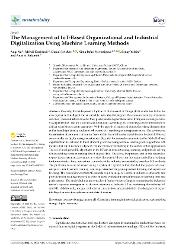| dc.contributor.author | Xu, Aoqi | |
| dc.contributor.author | Darbandi, Mehdi | |
| dc.contributor.author | Javaheri, Danial | |
| dc.contributor.author | Navimipour, Nima Jafari | |
| dc.contributor.author | Yalcin, Senay | |
| dc.contributor.author | Salameh, Anas A. | |
| dc.date.accessioned | 2023-10-19T15:12:07Z | |
| dc.date.available | 2023-10-19T15:12:07Z | |
| dc.date.issued | 2023 | |
| dc.identifier.issn | 2071-1050 | |
| dc.identifier.uri | https://doi.org/10.3390/su15075932 | |
| dc.identifier.uri | https://hdl.handle.net/20.500.12469/5346 | |
| dc.description.abstract | Recently, the widespread adoption of the Internet of Things (IoT) model has led to the development of intelligent and sustainable industries that support the economic security of modern societies. These industries can offer their participants a higher standard of living and working services via digitalization. The IoT also includes ubiquitous technology for extracting context information to deliver valuable services to customers. With the growth of connected things, the related designs often suffer from high latency and network overheads, resulting in unresponsiveness. The continuous transmission of enormous amounts of sensor data from IoT nodes is problematic because IoT-based sensor nodes are highly energy-constrained. Recently, the research community in the field of IoT and digitalization has labored to build efficient platforms using machine learning (ML) algorithms. ML models that run directly on edge devices are intensely interesting in the context of IoT applications. The use of intelligence ML algorithms in the IoT can automate training, learning, and problem-solving while enabling decision-making based on past data. Therefore, the primary aim of this research is to provide a systematic procedure to review the state-of-the-art on this scope and offer a roadmap for future studies; thus, a structure is introduced for industry sustainability, based on ML methods. The publications were reviewed using a systematic approach that divided the papers into four categories: reinforcement learning, semi-supervised learning, unsupervised learning, and supervised learning. The results showed that ML models could manage IoT-enabled industries efficiently and provide better results compared to other models, with significant differences in learning time and performance. The study findings are considered from a variety of angles concerning the industrial sector's capacity management of the new elements of Industry 4.0 by combining the industry IoT and ML. Additionally, unique and relevant instructions are provided for the designers of expert intelligent production systems in industrial domains. | en_US |
| dc.description.sponsorship | Prince Sattam bin Abdulaziz University [PSAU/2023/R/1444] | en_US |
| dc.description.sponsorship | This study is supported via funding from Prince Sattam bin Abdulaziz University project number (PSAU/2023/R/1444). | en_US |
| dc.language.iso | eng | en_US |
| dc.publisher | Mdpi | en_US |
| dc.relation.ispartof | Sustainability | en_US |
| dc.rights | info:eu-repo/semantics/openAccess | en_US |
| dc.subject | Anomaly Detection | En_Us |
| dc.subject | internet of things | en_US |
| dc.subject | industrial IoT | en_US |
| dc.subject | machine learning | en_US |
| dc.subject | industrial digitalization | en_US |
| dc.subject | sustainability | en_US |
| dc.subject | energy | en_US |
| dc.subject | digital economy | en_US |
| dc.title | The Management of IoT-Based Organizational and Industrial Digitalization Using Machine Learning Methods | en_US |
| dc.type | article | en_US |
| dc.authorid | Jafari Navimipour, Nima/0000-0002-5514-5536 | |
| dc.authorid | Javaheri, Danial/0000-0002-7275-2370 | |
| dc.identifier.issue | 7 | en_US |
| dc.identifier.volume | 15 | en_US |
| dc.department | N/A | en_US |
| dc.identifier.wos | WOS:000968989300001 | en_US |
| dc.identifier.doi | 10.3390/su15075932 | en_US |
| dc.identifier.scopus | 2-s2.0-85158088225 | en_US |
| dc.institutionauthor | N/A | |
| dc.relation.publicationcategory | Makale - Uluslararası Hakemli Dergi - Kurum Öğretim Elemanı | en_US |
| dc.authorwosid | Jafari Navimipour, Nima/AAF-5662-2021 | |
| dc.authorwosid | Javaheri, Danial/AAC-5132-2019 | |
| dc.khas | 20231019-WoS | en_US |
















